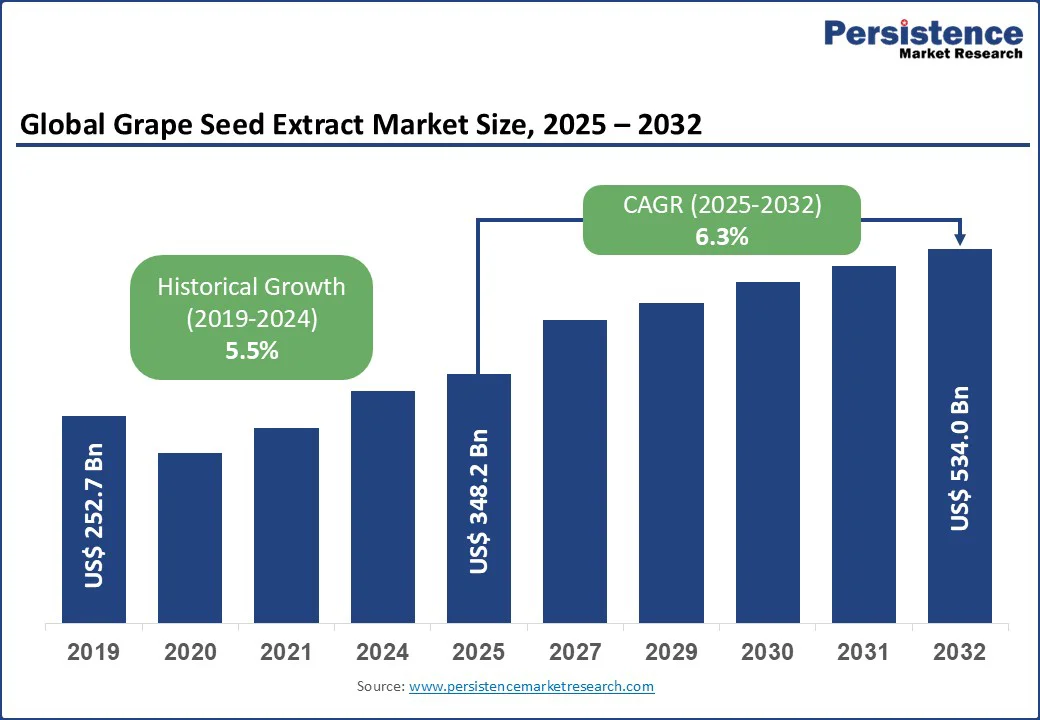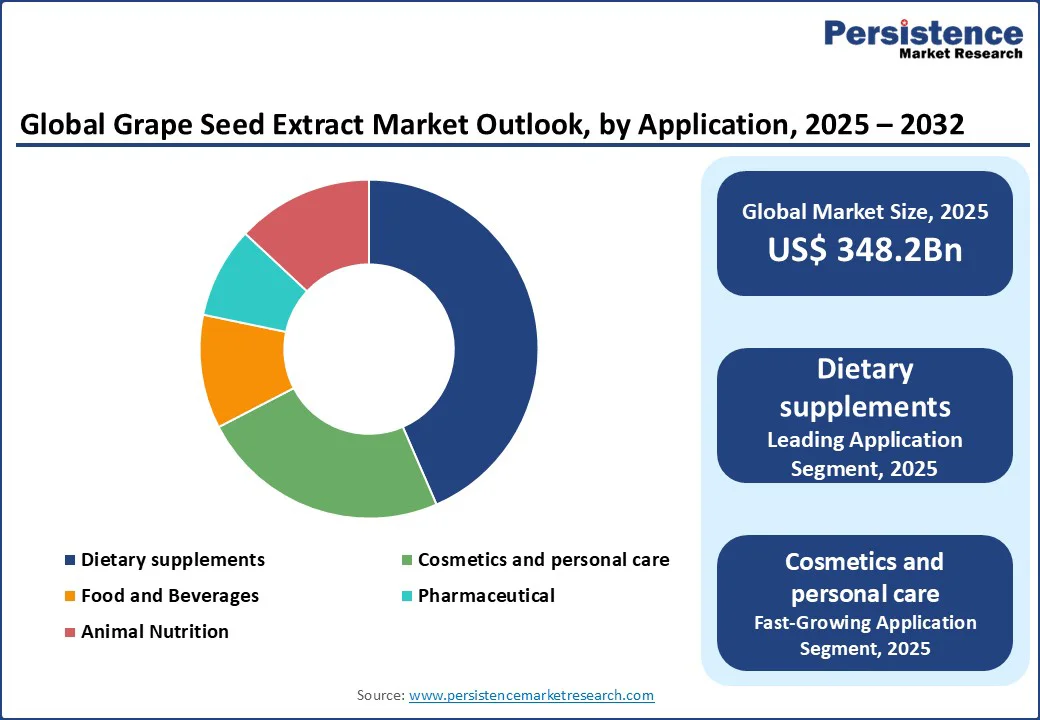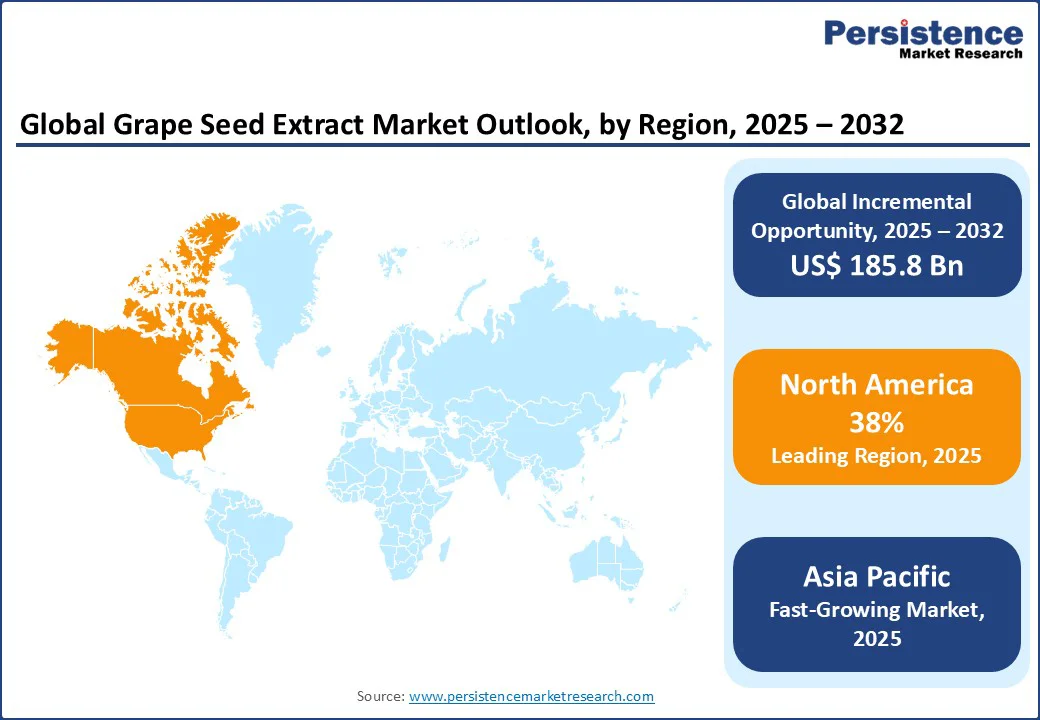ID: PMRREP12313| 188 Pages | 15 Sep 2025 | Format: PDF, Excel, PPT* | Food and Beverages

The global grape seed extract market size is likely to be valued at US$348.2 Bn in 2025 and expected to reach US$534.0 Bn by 2032, registering a CAGR of 6.3% during the forecast period from 2025 to 2032.
Key Industry Highlights:

|
Global Market Attribute |
Key Insights |
|
Grape Seed Extract Market Size (2025E) |
US$348.2 Bn |
|
Market Value Forecast (2032F) |
US$534.0 Bn |
|
Projected Growth (CAGR 2025 to 2032) |
6.3% |
|
Historical Market Growth (CAGR 2019 to 2024) |
5.5% |
The industry has experienced robust growth, driven by the rising demand for natural antioxidants, advancements in extraction technologies, and the increasing need for sustainable health and wellness solutions. The industry expansion is further supported by global efforts to enhance consumer health and improve natural ingredient adoption, particularly in North America, which dominates the market.
The global surge in health and wellness demands is a primary driver of the grape seed extract market. According to the Food and Agriculture Organization (FAO) and international health organizations, wellness product consumption must increase significantly to address rising lifestyle diseases, with natural extracts playing a critical role in boosting consumer health.
This rising demand, particularly in regions with high awareness of antioxidants and nutrient depletion in diets, underscores the need for effective grape seed extracts, which provide essential proanthocyanidins and polyphenols for cardiovascular support, skin protection, and anti-inflammatory benefits.
The cosmetics industry is increasingly adopting natural ingredients, which have anti-aging properties, driving formulation innovations. Consumers are showing a clear preference for natural over synthetic antioxidants in personal care products. Pharmaceutical applications benefit from grape seed’s bioavailability, with growing recognition of its role in managing blood pressure and cholesterol, leading to steady growth in pharma integrations.
The industry encounters notable restraints primarily due to the high costs of production and resource dependence. Since grape seeds are largely obtained as byproducts of the wine industry, their availability remains seasonal and heavily influenced by fluctuations in grape cultivation, resulting in inconsistent supply and unstable pricing. This dependency creates challenges for manufacturers seeking reliable, large-scale sourcing.
Furthermore, advanced extraction techniques such as ethanol and water-based processes require specialized infrastructure and skilled professionals, adding to operational costs and creating barriers for smaller players with limited resources. These factors collectively restrict the ability of emerging companies to enter the market.
In addition, stringent regulatory frameworks for maintaining purity, quality, and safety standards increase compliance expenses, particularly in regions where regulatory infrastructure is underdeveloped. Together, these challenges pose significant hurdles, slowing down widespread adoption and limiting the overall growth potential of the industry.
The grape seed extract market is witnessing strong opportunities driven by advancements in sustainable extraction technologies and its growing versatility across multiple applications. The adoption of eco-friendly methods, such as enzyme-assisted and green solvent extraction, not only reduces environmental impact but also enhances yield and efficiency, making the production process more sustainable and cost-effective in the long run. These innovations are particularly valuable as consumer demand increasingly favors products that align with sustainability and clean-label trends.
Beyond traditional applications in dietary supplements and cosmetics, it is gaining traction in emerging sectors. In animal nutrition, it is being explored for pet health formulations, where its antioxidant and anti-inflammatory properties contribute to overall wellness and vitality. Additionally, the incorporation of grape seed extract in novel food products, including functional beverages and fortified snacks, offers manufacturers an avenue to differentiate and meet rising health-conscious consumer preferences.
Expanding market reach into untapped regions such as Latin America and the Middle East further amplifies growth prospects, providing companies with significant opportunities to diversify revenue streams and strengthen global presence.
The grape seed extract market is segmented into conventional and organic. Conventional accounts for nearly 72% of the market share in 2025, driven by its cost-effectiveness, reliable scalability for industrial applications, and broad acceptance across supplements, cosmetics, pharmaceuticals, and food and beverage industries.
Organic represents the fastest-growing segment, fueled by rising consumer preference for clean-label, natural, and sustainable products. Its expanding adoption in health supplements and cosmetic formulations highlights the shift toward eco-conscious choices and premium-quality wellness solutions.
The grape seed extract market is segmented into liquid and powder. Powder leads with nearly 60% of the market share in 2025, attributed to its superior stability, cost-efficient transportation, and flexibility in formulation, making it highly suitable for supplements, functional foods, and cosmetics.
Liquid is the fastest-growing segment, supported by its rapid absorption benefits in pharmaceutical formulations and functional beverages. Increasing consumer interest in convenient, ready-to-drink health products further drives demand, positioning liquid extracts as a key growth contributor.
The grape seed extract market is divided into food and beverages, cosmetics and personal care, pharmaceuticals, dietary supplements, animal nutrition, and others. Dietary supplements lead with a 40% share in 2025, driven by their widespread use in health and wellness products.
Cosmetics and personal care are the fastest-growing segments, driven by rising consumer demand for natural, plant-based solutions. Its strong appeal lies in anti-aging, skin-protective, and antioxidant properties, making it a preferred ingredient in premium beauty and personal care formulations.

North America dominates the global grape seed extract market, expected to account for 38% share in 2025. The region’s strong market presence is fueled by high levels of health awareness and continuous innovation in natural and plant-based products. In the U.S., demand is particularly strong within dietary supplements, where it is widely used for its cardiovascular and immunity-boosting benefits. Rising concerns over lifestyle-related health conditions, including obesity and heart disease, further strengthen the adoption of grape seed extract in wellness formulations.
A notable trend shaping the market is the shift toward organic and clean-label products, reinforced by regulatory support that emphasizes the use of safe, natural ingredients. Retail collaborations with leading e-commerce platforms and large-scale retailers have also enhanced accessibility for consumers, contributing to broader adoption. Canada complements this growth by demonstrating increasing interest in clean-label cosmetics and health-focused products, further solidifying North America’s position as a leader in the global market.
Europe maintains a significant position in the global grape seed extract market, with France, Germany, and Italy emerging as the primary contributors to regional growth. France leads the global industry, supported by its extensive grape production, which ensures consistent raw material availability from the country’s robust wine industry. This advantage has enabled France to drive innovation in pharmaceutical applications, while also aligning with the European Union’s strong emphasis on clean beauty and sustainable ingredient use.
Germany follows closely, with rising consumer interest in natural and organic health solutions strengthening the market for supplements containing grape seed extract. The country’s growing demand for wellness and functional nutrition further supports its position as a key growth hub. Italy contributes significantly as well, with multi-application use of grape seed extract across food and beverage categories. The country’s focus on the Mediterranean diet, which emphasizes antioxidants and plant-based health benefits, drives adoption and highlights its role in the regional market landscape.
Asia Pacific represents the fastest-growing region in the global grape seed extract market, with China, India, and Japan emerging as the primary growth drivers. China plays a leading role, supported by its extensive production capacities and rapidly expanding middle-class population that is increasingly investing in health and wellness products. The country’s strong nutraceutical industry provides a fertile ground for the use of grape seed extract in dietary supplements and functional foods. India is also witnessing significant growth, fueled by rising consumer awareness of natural remedies for skin health, cardiovascular wellness, and overall immunity.
The integration of grape seed extract into Ayurvedic and herbal formulations is further accelerating its adoption. Japan contributes substantially to regional growth through its well-established cosmetics sector, where the country’s aging population is driving demand for anti-aging and skin-protective products. The strong emphasis on natural and clean-label cosmetics in Japan positions grape seed extract as a key ingredient in innovative beauty and personal care solutions.

The grape seed extract market is highly competitive, with global and regional players striving for advantage through product innovation, sustainable practices, and cost efficiency. The growing emphasis on multi-grade formulations and compliance with strict regulations further drives rivalry. Strategic mergers, partnerships, and timely regulatory approvals serve as crucial differentiators, enabling companies to strengthen market presence and expand applications.
The grape seed extract market is projected to reach US$348.2 Bn in 2025.
Rising health awareness, technological advancements in extraction, and government initiatives for natural products are key drivers.
The grape seed extract market is poised to witness a CAGR of 6.3% from 2025 to 2032.
Innovations in sustainable extraction and multi-application solutions present significant growth opportunities.
Indena S.P.A., Naturex, and Nexira are among the leading players.
|
Report Attribute |
Details |
|
Historical Data/Actuals |
2019 - 2024 |
|
Forecast Period |
2025 - 2032 |
|
Market Analysis |
Value: US$ Bn Volume: As Applicable |
|
Geographical Coverage |
|
|
Segmental Coverage |
|
|
Competitive Analysis |
|
|
Report Highlights |
|
By Nature Type
By Form
By Application
By Region
Delivery Timelines
For more information on this report and its delivery timelines please get in touch with our sales team.
About Author